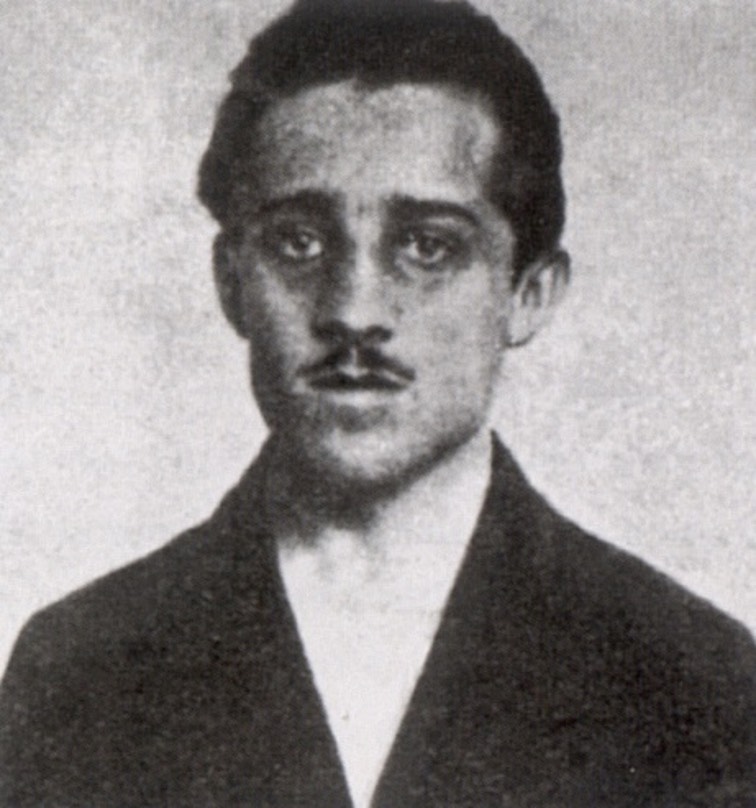March 22nd, 2012

Time Magazine has its Person of the Year, which they define to be the person who, for better or ill, most influenced events during that year. In 1999 they chose Albert Einstein to be Person of the Century. It’s a good choice, but I think that there’s a solid argument for Gavrilo Princip having earned that title, all because of what he did just before 11:00 AM on June 28th, 1914, in front of Moritz Schiller’s cafe in Sarajevo. He stepped off the curb and fired his pistol twice into an open car carrying the Archduke Franz Josef and his wife Sophie, who both died.
This single event, it is universally agreed, triggered World War I, in which perhaps 17 million people died. Some have argued that the assassination was merely the trigger point for a war that was inevitable. I disagree. It is true that Europe in the summer of 1914 was tense and not quite stable, but nobody really expected a major war that year. Each of the armies had detailed plans for how to respond to the outbreak of war – but those plans were not atop anybody’s desk; they were all sitting quietly in their file cabinets.
It is also true that nobody appreciated the seriousness of a modern war; indeed, the nations of Europe were all wallowing in the benighted belief that war was a cleansing agent that cleared out the dredges of society and ennobled all involved. Once the drums of war started to beat, the populations all eagerly took up the chant, expecting a short, sharp little war with few casualties. The phrase “Home before Christmas” was tossed about freely in the newspapers.
Nevertheless, none of the leaders were eager for war. The generals were just beginning to figure out how to properly utilize new technologies such as airplanes and radio, and they would have preferred more time to incorporate them into their systems. The national leaders were aware of the domestic risks; a shaky empire like the Russian or Austro-Hungarian Empire could easily fall apart in the stress of a protracted war. Indeed, Kaiser Wilhelm later claimed that he didn’t realize when he authorized mobilization that he was, for all intents and purposes, declaring war. This was a war that nobody really wanted that they all managed to bumble into. Had Gavrilo Princip not lit the spark, it is likely that Europe would have stumbled through the next ten or twenty years without a major war.
Instead, the unstable regimes of the Russian and Austro-Hungarian Empires would have collapsed from their own structural weaknesses. Those collapses would likely have triggered local wars, but it is unlikely that the rest of Europe would have been sucked into the vortex. Instead, eastern Europe would have gone through violent convulsions, emerging with new countries and regimes vaguely like what was established by the Treaty of Versailles. I believe that the instabilities would have continued for decades, consuming some millions of lives but never flaming into major war.
But here’s the really tragic thing about Gavrilo Princip: the war he triggered was too soon and too bloody to produce a final result. The war ended more out of exhaustion than by any admission of defeat by the Central Powers. Germany and Austria never got over the feeling that they hadn’t really lost World War I, but instead were stabbed in the back by politicians. This set the stage for Hitler to rise to power, promising to right the wrongs of the Versailles Treaty – which led to World War II, which consumed at least 50 million lives.
Thus, Gavrilo Princip is ultimately responsible for the deaths of at least 67 million people. Now, history is complicated and there were many other factors at work, so it might seem simplistic to blame it all on one stupid kid (he was 19 years old at the time). It’s certainly true that the stupidity and perfidy of politicians all over Europe played a larger role in making the war than Princip’s stupidity. But the complex chain of causality converges on Gavrilo Princip. Had he not fired his pistol, it is likely that the twentieth century would not have been as bloody as it turned out to be.
Princip himself was convicted of high treason. However, because he was 27 days short of his 20th birthday, the laws of the barbaric Austro-Hungarian Empire (barbaric compared with the enlightened modern law of the USA) did not permit a death sentence. He was sentenced to only 20 years in jail. Nevertheless, he died after just 3 years, weakened by poor food and unsanitary conditions in prison.
